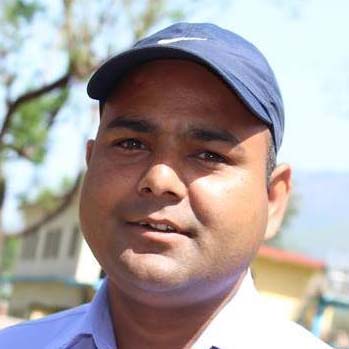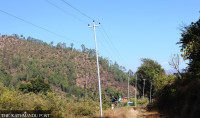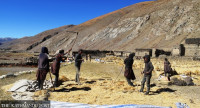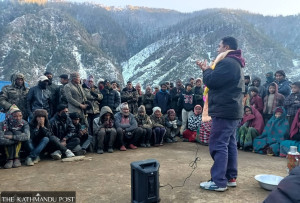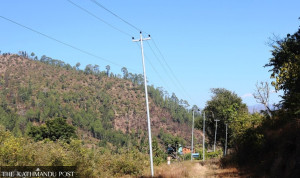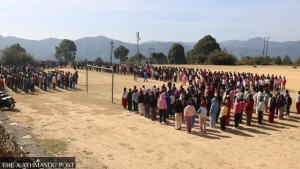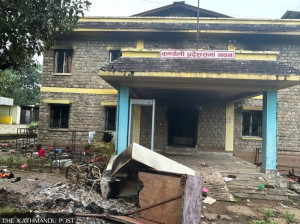Karnali Province
Earthquake-displaced are falling sick due to poor living conditions and cold
Drinking water is a big concern. They complain that the relief materials provided by the government are not enough._061196ka.jpg&w=900&height=601)
Krishna Prasad Gautam
Khal Bahadur Mahar and his family of six have been living in a tarpaulin tent since Friday night after they managed to escape from their house. What remains of their house in Rawatgaun in ward 1 of Bheri Municipality in Jajarkot now is only heaps of debris.
The magnitude 6.4 earthquake with its epicentre at Ramidanda destroyed Mahar’s two houses that night. He could not salvage any belongings from either of his houses.
“We rushed out of the house when the ground began to shake. We made it out just in time with only the clothes on our back,” said Mahar. “Since then we have been living outside in the cold. My wife and children have fallen sick due to the cold weather. All of them are suffering from fever and cold. I have been taking care of them but there is not much I can do since we don’t have warm clothes or nutritious food to help them recover.”
The earthquake-displaced people say that the relief materials provided to them by the government are not enough. Each displaced family received a tarpaulin tent and a blanket.
Sudarshan BK, a resident of ward 3 of Nalgad Municipality, became a father for the second time recently. But he hasn’t been able to take joy in his fatherhood. In fact, his newborn baby, his postpartum wife, his elderly parents and his older child have fallen sick due to the cold.
“All my family members, including the newborn, have been suffering from high fever and cold. The tent does not protect us from the cold nights and the morning chills,” said BK. “It’s impossible for anyone to fall asleep at night. The cold and the fear of another earthquake keep us up at night affecting our physical and mental health.”
According to BK, the displaced people in ward 3 are at risk of catching water-borne diseases since they have been drinking water from the local stream. “The local drinking water project was destroyed by the earthquake. There is no other source of clean drinking water. We have been drinking water from the local stream and I’m afraid that will make us all more sick.”
Water supply has been affected in Khalanga, the district headquarters of Jajarkot, too. The earthquake destroyed houses and toilets which have led people to defecate in the open. The locals are worried about the possible outbreak of diarrhoea or other diseases due to a lack of safe drinking water sources.
“We have become homeless during the harsh winter season. With no roof over our heads, fire in the hearth and warm food in our stomachs, we are at risk of weakening physical health,” said Badri Shah, a local of ward 3 of Bheri. “Open defecation and the lack of clean drinking water has put us all at higher risk of contracting water-borne diseases.”
According to Krishna Bahadur Khatri, information officer at the Jajarkot district hospital, almost 30 to 40 patients suffering from cold and fever have been visiting the hospital daily since the earthquake. Six injured people are currently receiving treatment in the hospital.
“We have been providing medicines to patients with fever and cold,” said Khatri. “The displaced are falling ill due to insufficient protection from the cold.”
Suresh Sunar, chief district officer of Jajarkot, said that the government has been sending medicines to the local units affected by the earthquake. “In the quake-hit areas where survivors are living in tents, several are falling ill due to the cold weather,” he said. According to him, doctors and health workers have also been dispatched to the affected areas.
According to Ganga Bahadur BK, a resident of Chiuritol in ward 1 of Nalgad Municipality, about 150 families in the village are living under tarpaulin tents. At least 13 people died and 50 houses were completely destroyed in the earthquake in the municipality on Friday. Similarly, some 200 domestic animals were also killed. “Since we haven’t been able to clear the rubble, the animal carcasses buried underneath have started to decompose. It’s becoming unbearable living in these conditions,” said Ganga. “Almost all families here have more than three members each. The local unit gave us one blanket. It’s impossible to keep warm.”
Dambar Bahadur Rawat, mayor of Nalgad Municipality, however, says they have provided food and essentials enough to last a week. “We are planning to distribute woollen clothes soon,” said Rawat. “We have also deployed health workers to the affected areas.”
Prakash Gharti, mayor of Bheri Municipality, one of the affected local units in Jajarkot, said that the municipality is working to improve the health of the displaced.
“We have requested the victims to drink water only after boiling as this will help prevent various illnesses. Cases of cold and fever are on the rise. We have already sent an additional batch of medicines to the local health facilities,” said Gharti. “We have asked the local health posts to monitor the situation closely.”




 10.12°C Kathmandu
10.12°C Kathmandu